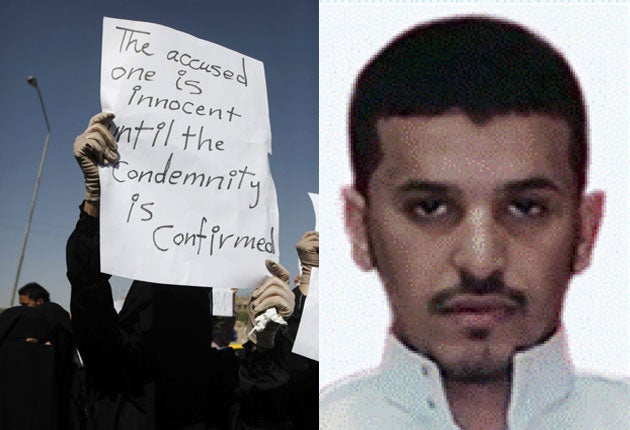Investigation falters as female bomber suspect is released

Your support helps us to tell the story
This election is still a dead heat, according to most polls. In a fight with such wafer-thin margins, we need reporters on the ground talking to the people Trump and Harris are courting. Your support allows us to keep sending journalists to the story.
The Independent is trusted by 27 million Americans from across the entire political spectrum every month. Unlike many other quality news outlets, we choose not to lock you out of our reporting and analysis with paywalls. But quality journalism must still be paid for.
Help us keep bring these critical stories to light. Your support makes all the difference.
A 22-year-old Yemeni woman who was arrested on suspicion of sending bombs to American synagogues was released last night after the country's officials admitted that they no longer believed she was responsible for the shipment.
Hanan al-Samawi, an engineering student at Sana'a University, had been arrested along with her 45-year-old mother, who was later released. At first police maintained that Ms al-Samawi's mobile telephone had been traced in connection with the packages.
Dozens of students held a protest rally at the university following Ms al-Samawi's arrest, carrying banners reading "We are all Hanan". Her lawyer said she was being used as a scapegoat. Yesterday Yemeni officials said that a shipping agent called in to identify her said that she was not the person who signed the form. The authorities now say she was the victim of identity theft.
The development leaves the authorities with no suspect in custody for posting the explosive devices designed to bring down airliners, which were yesterday revealed to have been transported on two passenger flights without being detected. They were only finally found following an intelligence warning. The man believed to have made the bombs, Ibrahim Hassan al-Asiri, who is believed to be working closely with the radical US-born cleric Anwar al-Awlaki, is now the prime target.
The package, containing incendiary material difficult to spot on ordinary airport scanners, was placed on a Qatar Airbus A320 from the Yemeni capital, Sana'a, to Doha, and then taken on another plane, possibly a Boeing 777, to Dubai, where police moved in.
It had been previously thought that both devices, addressed to synagogues in Chicago, and posted through two US freight services, UPS and FedEx, had only been transported on cargo planes, which would not have put large numbers of travellers at risk.
In a statement yesterday, Qatar Airways said: "It is not the responsibility of the country in which the cargo transits to X-ray or inspect the cargo. This responsibility belongs to the country from where the consignment originates.
"Furthermore, the explosives discovered were of a sophisticated nature whereby they could not be detected by X-ray screening or trained sniffer dogs. The explosives were only discovered after an intelligence tip-off."
After a forensic examination of a second bomb, found at East Midlands airport, Theresa May, the Home Secretary, said: "We do not believe that the perpetrators of the attack would have known the location of the device when they planned for it to explode. The target may have been an aircraft and, had it detonated, the aircraft could have been brought down."
That contradicted President Obama's chief terrorism adviser, John Brennan, who said the devices could "be detonated at a time of the terrorists' choosing".
Mr Brennan added: "It would be very imprudent to presume that there are no other packages out there." A warning from the head of Saudi intelligence service said that up to 15 devices may have been put on flights from Yemen, according to senior security sources.
However, initial searches by airport security staff failed to locate the device containing the substance pentaerythritol trinitrate (PETN).
Lord Carlile, who reviews the Government's anti-terrorism legislation, said: "The one weakness I would identify... is that the technical equipment used at East Midlands airport apparently did not detect the explosives at the first attempt."
Subscribe to Independent Premium to bookmark this article
Want to bookmark your favourite articles and stories to read or reference later? Start your Independent Premium subscription today.
Join our commenting forum
Join thought-provoking conversations, follow other Independent readers and see their replies
Comments